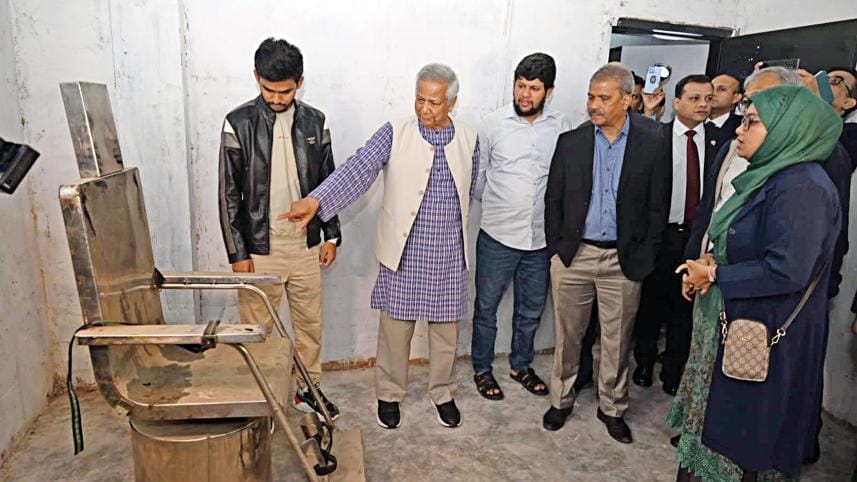Aynaghar horrors never again

"The level of brutality here is beyond belief. The more we hear about it, the more unreal it feels. Is this our society?"
Chief Adviser Prof Muhammad Yunus has said the Awami League government wrought upon the country an "Ayyām al-Jāhiliyyah", an Arabic term that refers to pre-Islamic era barbarism, social injustice, and moral corruption.
The secret detention centres and torture rooms, better known as Aynaghar, are just one aspect of that regime, Prof Yunus told reporters after visiting three secret prisons in the capital yesterday.
"The things that happened here are grotesque," he told reporters after the visit.
Several survivors, family members of the victims, six advisers, and journalists from Al Jazeera, Netra News, BTV, PID and members of the Commission of Inquiry on Enforced Disappearance accompanied the chief adviser.
He said the horror inflicted on people to destroy their sense of humanity.
"The level of brutality here is beyond belief. The more I hear about it, the more unbelievable it feels. Is this our world, our society? How could we do this?" he asked.
He said the victims themselves told him and the others what they had endured.
"People who committed no crimes were simply abducted from the streets. Witnesses were brought in, some explosives were put in the car, and then they said, 'You are a terrorist, a militant'.
"I thought there were a few of what they call Aynaghar. But now I hear that there are different versions of Aynaghar across the country. Some say there are 700. Some say 800. The exact number is unknown."
The torture cells reflect the abominable state of the country during the previous regime, he said. "People have been deprived of their bare minimum human rights."
He added that he heard there were over 1,700 victims. "But there are victims who are still unknown. Some say the total number could be 3,000," he said.
"People have disappeared, they have vanished. No one knows where they are. A daughter was with us today. She said it had been nine years since her mother had been taken away. She was there when her mother was picked up. It's heartbreaking.
"The hardest truth here is: the perpetrators are our children, our brothers and our family members. If we cannot bring our society out of this, if our children do things that humans cannot do, then our society will not survive."
He added that one of the victims described the cell as smaller than a chicken coop. "It is our crime that we let this happen."
The individuals responsible for these must be held accountable.
Yunus then said the evidence would be kept sealed and secured so that it can be used in legal proceedings and future trials.
"We want to build a new Bangladesh, a new environment… We must ensure that this never happens again in the future. This is one of the worst crimes ever committed in the world."
Advisers Nahid Islam and Asif Mahmud Shojib Bhuyain identified the cells in which they were kept after being picked up by men in plainclothes during the mass uprising.
Nahid was kept at a joint interrogation cell operated by the Directorate General of Forces Intelligence (DGFI) inside a detention centre of Rab-2 while Asif was kept at the Taskforce Intelligence Centre in the Rab headquarters.
Nahid said one side of the room had something resembling a sink. It was used as a toilet.
After August 5, the day Sheikh Hasina fled the country, some of the walls had been demolished and some repainted, he added.
Asif recognised the cell from its walls and mentioned that there was an exhaust fan at the top of the wall.
He told journalists that he was kept incommunicado in the cell for four days. Even when he had to go to the toilet, his captors would blindfold him and then take him out of the cell.
The visitors included former Brig Gen Abdullahil Aman Azmi, son of late Jamaat leader Ghulam Azam. He was kept in a secret prison for eight years.
Mir Ahmad Bin Quasem, the younger son of executed Jamaat leader Mir Quasem Ali, and Hummam Quader Chowdhury, son of executed BNP leader Salauddin Quader Chowdhury, were also among the visitors. Ahmad had been in a secret cell for eight years and Hummam for seven months.
Chief Adviser's Press Secretary Shafiqul Alam later said locations of the secret cells would be identified.
Asked why only a select few journalists could accompany Prof Yunus, Shafiqul said the rooms were extremely narrow and in some cases, pathways were created by "breaking bricks". The entire process was logistically challenging.
He expressed regret for not being able to invite more journalists.



 For all latest news, follow The Daily Star's Google News channel.
For all latest news, follow The Daily Star's Google News channel.
Comments